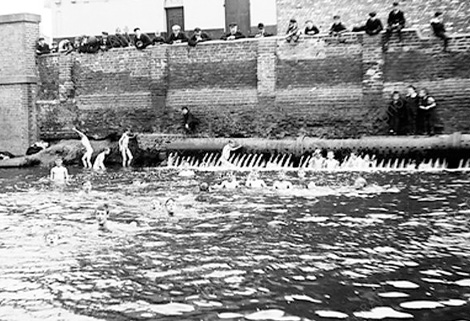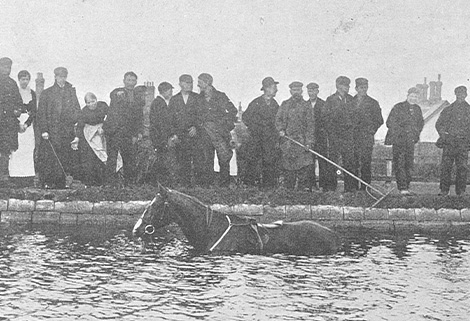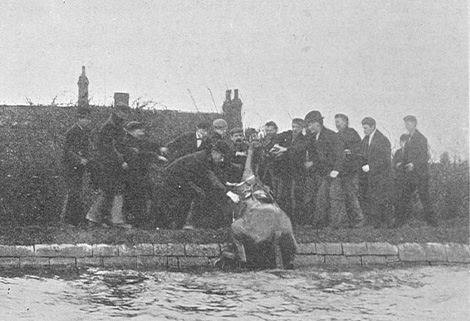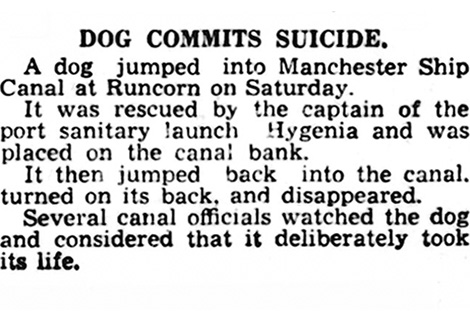tales from the old cut
novel news
An occupational hazard of spending too much time rummaging through old newspapers is that you become somewhat de-sensitised to the macabre as, such is the nature of journalism, it’s the grim and the grisly that sells the most papers.
This time of year is miserable enough without me talking about death and destruction, so instead I’ve pulled a selection of the more amusing incidents that have occurred over the years on the water.
‘Amusing’ is of course a subjective word, and I don’t think the Wolverhampton policemen in 1906 were laughing when they were sent to arrest a chicken thief, tricked into climbing into a boat's cabin and locked in by their helpful informants.
We can presume that the boat, being unlocked, must have been a day boat, and we can also presume that she had a small stove on board that was probably lit, because the “jokers,” as the newspaper described them, poured a bucket of water down the chimney before pushing her out into the middle of the canal for good measure.
How long the policemen were stuck in the little cabin for we don’t know, but it was long enough for the merry pranksters to go to the pub and imbibe enough alcohol to think it was a good idea to tell everyone what they’d done, and eventually someone had the presence of mind to go and tell a different copper, who rescued his colleagues.
You’ll perhaps be unsurprised to hear that the police quite regularly participated in ‘amusing incidents’ that tickled the fancy of the newspapers and while it’s true that the boaters as a whole didn’t trust or respect their authority, neither did much of the rest of the population either. In 1878, the Manchester Evening News reported with ill-disguised glee of a policeman getting “belaboured…with great vigour” by a boatwoman and her children.
Emma Carter was steering a boat being pulled by a horse with collar sores on its shoulders, and she threw stones at it to try and make it go on. A policeman stopped her and took the horse away under the relatively new Cruelty to Animals Act and tried to make her come with him to the police station. She refused, arguing the boat needed to get ahead and took up the tow herself. The policeman came back with reinforcements so she jumped on and pushed the boat into the canal, forcing the policemen to grab what appears to have been a small coracle type of boat so they could get to her.
The newspaper delightedly added the that the little boat was half full of water so the policeman took off his shoes and socks before getting in.
The brave officers made it to the boat, where Emma picked up the cabin shaft and tried to fend them off while getting increasingly belligerent. The men managed to board the boat, at which point she and all the children “seized thick sticks” and started whacking them. The boat had drifted close enough to the bank during this so when Emma had her stick taken from her and she desperately grabbed the bread knife instead, someone managed to take it from her before things turned ugly. It perhaps says a lot about the hidden details of this incident however that Emma was only fined rather than being properly arrested.

Violence wasn’t the only think that caused LOLZ; thinly camouflaged under a veneer of indignance, nudity was a hot topic. The Bridgewater canal served as both a transport route and the worlds biggest bathtub, and residents of Stockton Heath were subjected to the sight of men and boys in the canal “without proper bathing costumes” so often that they made a protest in 1913, demanding that the canal company enforce the ‘no bathing’ signs. The newspaper feigned horror as it described how the bathers didn’t bother with swimming costumes or even with towels, instead dying off by “racing up and down the canal bank naked”. History doesn’t relate how the bathers and the boats interacted, although given the nude condition of the bathers one would presume ‘carefully’, lest an irate boatwoman decided to take aim with a mopstick.
Nudity and sporting daring-do came together in one gem of a tale in 1909 when a telegram for Manchester United Football Grounds came through with only 15 minutes for the messenger to deliver it. Faced with an impossible task, he told his tale of woe to a fellow messenger who volunteered to strip off and swim the message across the canal with the telegram tied to his head like a hat, which he duly did. For some reason, quite probably to do with heroics, the original messenger also decided to strip off and go with the telegram across the water, and the bemused site manager was met with two nude boys dripping water in the foyer, proudly delivering the telegram with one minute to spare.


Staying in the sporting realms, the newspapers chuckled away to themselves in 1935 when two rider-less racehorses failed to make canal turn at Aintree and ended up going straight into the canal. Aureate Earth and Top Toi refused to come into the towpath and swam on for nearly half a mile before finally being brought to a stop at the next swing bridge. This wasn’t the first time a horse had made an error at canal turn, with Command trying to jump the canal 1919 and Holoscope doing the same in 1905. Laplander did things a little differently in 1902 however, making canal turn well enough before going off the course, up the slope and jumping straight into the canal, apparently to his own surprise as he swam to the towpath and awaited rescue.
It wasn’t just horses in the canal that the newspapers picked up on; in 1936 the local papers reported incredulously that a dog had been witnessed committing suicide in the Manchester Ship Canal at the aptly named No Mans Land, which led to a couple of papers publishing editorials on the concept.


Ship canals seemed to produce excellent material for incredulity; 1892 the local paper reported on the inquest of a man who’d died after being tipped out of his pony cart, after the pony had been spooked by a group of men in the nearby meadow yelling and trying to recapture an escaped pig that had been obtained by said men with the concept of making the animal swim for a mile in the Chichester Ship Canal. No one appeared to know exactly why anyone thought this was a great idea, and history doesn’t relate as to whether the pig was ever made to complete its swim.

